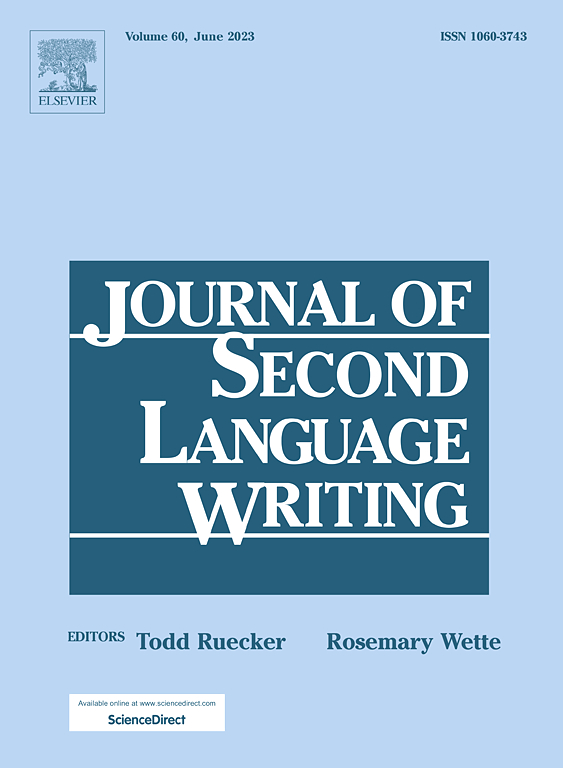Steering toward situational propensity/shi 势: A multicase study of planning and developing EFL writing centres in China
IF 4.5
1区 文学
Q1 LINGUISTICS
引用次数: 0
Abstract
Compared with the abundant scholarship on tutor-student interactions during writing centre tutorials, little research has investigated the planning and development of English as a Foreign Language (EFL) writing centres with consideration of specific sociopolitical contexts. From the perspective of academic language policy and planning (ALPP), this study compared the planning and the (failure of) sustainable development of three Chinese writing centres—two thriving ones and a closed one—through the lens of agency and by drawing on an indigenous Chinese notion of shi (势, situational propensity). With a shi-inflected agency framework, we analysed interview and document data from three groups of actors: writing centre directors, tutors, and tutees. Our findings uncovered intriguing insights into shi-inflected agency in planning and developing EFL writing centres: two operational strategies were identified for writing centre ALPP (noting and following shi, and creating shi), highlighting the importance of (1) aligning with macro-level shi and integrating it with meso- and micro-level shi, and (2) managing yin-yang alternations to transform constraints into affordances. Implications are duly provided for international writing centres and L2 writing support practitioners in EFL contexts across the globe.
情境倾向导向:中国英语写作中心规划与发展的多案例研究
与大量关于写作中心辅导中导师与学生互动的研究相比,很少有研究将特定的社会政治背景考虑到作为外语的英语写作中心的规划和发展。本研究从学术语言政策和规划(ALPP)的角度,通过代理的视角,并借鉴中国本土的“情境倾向”概念,比较了三个中国写作中心(两个繁荣的和一个封闭的)的规划和可持续发展(失败)。我们采用了一种带有shivinflected代理框架,分析了来自三组演员的访谈和文件数据:写作中心主任、导师和学生。我们的研究结果揭示了在规划和发展英语写作中心中受“诗”影响的代理的有趣见解:为写作中心ALPP确定了两种操作策略(注意并遵循“诗”和创造“诗”),强调了(1)与宏观层面的“诗”保持一致,并将其与中观和微观层面的“诗”相结合,以及(2)管理阴阳交替,将约束转化为支持的重要性。为国际写作中心和第二语言写作支持从业者在全球范围内的英语语境提供了适当的启示。
本文章由计算机程序翻译,如有差异,请以英文原文为准。
求助全文
约1分钟内获得全文
求助全文
来源期刊

Journal of Second Language Writing
LINGUISTICS-
CiteScore
8.80
自引率
13.10%
发文量
50
审稿时长
59 days
期刊介绍:
The Journal of Second Language Writing is devoted to publishing theoretically grounded reports of research and discussions that represent a significant contribution to current understandings of central issues in second and foreign language writing and writing instruction. Some areas of interest are personal characteristics and attitudes of L2 writers, L2 writers'' composing processes, features of L2 writers'' texts, readers'' responses to L2 writing, assessment/evaluation of L2 writing, contexts (cultural, social, political, institutional) for L2 writing, and any other topic clearly relevant to L2 writing theory, research, or instruction.
 求助内容:
求助内容: 应助结果提醒方式:
应助结果提醒方式:


